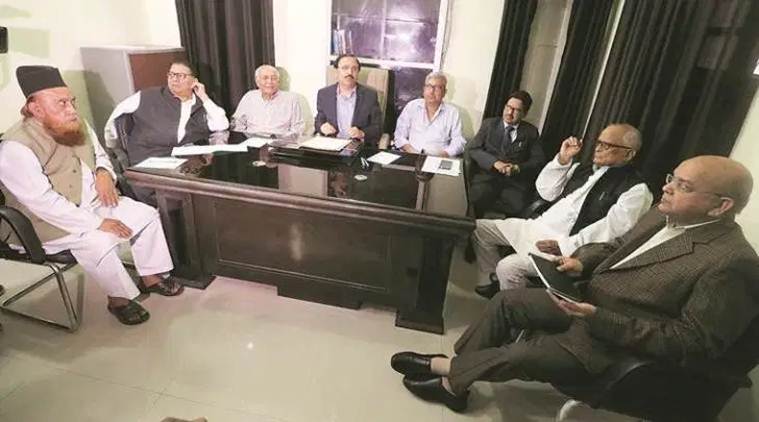 Members of the Sunni Central Waqf Board. (Express photo by Vishal Srivastav)
Members of the Sunni Central Waqf Board. (Express photo by Vishal Srivastav)
The Uttar Pradesh Sunni Central Waqf Board on Monday decided to accept the 5-acre land allocated by the state government in Ayodhya and set up a trust to build a mosque, two centres to showcase Indo-Islamic culture and study, a charitable hospital, and a public library on the site.
The decision was taken unanimously by six members of the Board, headed by chairman Zufar Ahmed Faruqi, in a meeting. Two other members, who had earlier raised objection to the plot offered, skipped Monday’s meeting.
Faruqi later said the trust will be formed soon and will be responsible to arrange money for developing the mosque and other buildings. He said the Board will not help the trust financially.
The government has allotted land to Sunni Waqf Board at Dhannipur village of Raunahi block, around 30 km from Ayodhya on Lucknow-Gorakhpur highway. The land is around 200 metres from the highway.
In a statement, Faruqi said: “The Government of Uttar Pradesh, in compliance of the order dated November 9, 2019 passed by Supreme Court in a Civil Appeal of 2010 and other connected matters, has allotted 5 acres land to the Uttar Pradesh Sunni Central Waqf Board. The board in its meeting held today has decided that it is accepting the aforesaid land,”
He stated, “The board has resolved that it will constitute a Trust regarding the aforesaid 5-acre land. The said Trust will construct a mosque along with a centre to showcase Indo-Islamic culture of several centuries, a centre for research and study of Indo-Islamic culture, a charitable hospital, a public library, and other public utilities facilities for all sections of the society.”
Faruqi later told the media that the name and size of the mosque is yet to be decided. He said, “We will constitute a trust for construction of the mosque, and details of the (proposed) trust and its office-bearers will be announced once the trust comes into existence, which is expected soon. We have not yet decided the dimensions of the mosque; it will be formed as per local requirements. There is already a shrine there, but not on the allotted land.”
On the two Board members who skipped Monday’s meeting, Faruqi said Imran Mahmood has not attended any meeting since 2010. Abdul Razzaque Khan was the second member not present.
Challenge to collect funds
With strong opposition from the Muslim community against the decision to accept the 5-acre land from the state government, it will be a big challenge for the proposed trust to collect funds to build all the planned structures. Muslim organisations such as the All-India Muslim Personal Law Board and Muslim litigants in the case have made public their difference with the land allocation proposal. In such a scenario, with the announcement that no fund will be taken from Sunni Waqf Board, the trust will have to convince Muslims if they want crowd-funding, or funding from foreign sources.
“Six members were present in the meeting, including me, and the decision to accept the land was taken unanimously. The amount required for the construction will be raised by the trust through its own resources, be that public contribution or anything else. The Board will not give any money, and we haven’t talked about taking it from the government either.”
Besides Board chairman Faruiqui, others who participated in the meeting are Adnan Farooq Shah, Mohammad Junaid Siddiqui, Abrar Ahmad, Mohammad Juneed, and Maulana Syed Ahmad.
Abdul Razzaque Khan, who skipped the meeting, said he has already announced that he does not agree with the Board accepting the land since it is against Islam, but added that he would have attended the meeting if he had time. He alleged, “All those in the Board are under pressure, as the government has things against them which can be used. This is why they agree to whatever the government wants them to.”